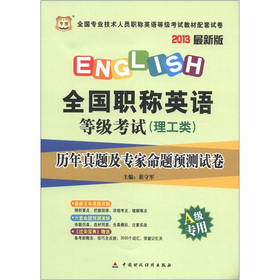华图•全国职称英语等级考试(理工类):历年真题及专家命题预测试卷(A级专用)(2013最新版)
作 者:崔守军 编
出 版 社:中国财政经济出版社
出版时间:2012年10月
定 价:32.00
I S B N :9787509540497
所属分类: 教育学习 > 语言学习 > 英语 > 英语专项训练 > 真题
标 签:考试 其它英语考试 外语学习 英语考试
职称英语考试是全国专业技术人员职称外语等级考试的一种,是全国统一标准的职称外语考试,采取统一大纲、闭卷笔试的形式进行。2013年职称英语根据英语在不同专业领域活动中的应用特点,结合专业技术人员掌握和应用英语的实际情况,对申报不同级别职称的专业技术人员的英语水平提出了不同要求。
《华图·全国职称英语等级考试(理工类):历年真题及专家命题预测试卷(A级专用)(2013最新版)》分为两部分。第一部分收录了2008-2012年的职称英语考试真题,并辅以详细的参考译文和解析,帮助应试者快速熟悉历年考试题型、内容和难度;第二部分精编了6套专家预测试卷,其中阅读理解部分均以考试大纲指定的教材文章为材料,并辅以详细的参考译文和解析。此外,《华图·全国职称英语等级考试(理工类):历年真题及专家命题预测试卷(A级专用)(2013最新版)》还随书附赠备考指南,方便考生掌握系统的学习方法。
崔守军,博士,毕业于外交学院,现为中国人民大学“当代中国研究”(Program of Cotempory China Studies)全英文硕士项目主任,中国人民大学国际关系学院硕士研究生导师,美国东西方研究中心(East and West Center)、英国伦敦国王学院(King'''' sCollege of London)、芬兰赫尔辛基大学(University of Helsinki)等院校和研究机构访问学者。崔博士对英文教学和应试颇有研究,经验丰富.能够帮助考生最大限度提高应试技巧和能力,从竞争中脱颖而出。
第一部分 2008-2012年全国职称英语等级考试试题及详解
2012年度全国职称英语等级考试试卷理工类A级
2011年度全国职称英语等级考试试卷理工类A级
2010年度全国职称英语等级考试试卷理工类A级
2009年度全国职称英语等级考试试卷理工类A级
2008年度全国职称英语等级考试试卷理工类A级
参考答案及解析
2012年度全国职称英语等级考试试卷理工类A级
2011年度全国职称英语等级考试试卷理工类A级
2010年度全国职称英语等级考试试卷理工类A级
2009年度全国职称英语等级考试试卷理工类A级
2008年度全国职称英语等级考试试卷理工类A级
第二部分 专家命题预测试卷及详解
理工类A级专家命题预测试卷一
理工类A级专家命题预测试卷二
理工类A级专家命题预测试卷三
理工类A级专家命题预测试卷四
理工类A级专家命题预测试卷五
理工类A级专家命题预测试卷六
参考答案及解析
理工类A级专家命题预测试卷一
理工类A级专家命题预测试卷二
理工类A级专家命题预测试卷三
理工类A级专家命题预测试卷四
理工类A级专家命题预测试卷五
理工类A级专家命题预测试卷六
Future therapies could decode the brain activity pattems of an athlete or a musician, and use them as a benchmark for teaching another person a new activity, according to the researchers.
Scientists from Boston University and ATR Computational Neuroscience Laboratories in Kyoto used functional magnetic resonance imaging, or fMRI, to study the leaming process. They were examining the adult brain''''s aptitude for visual perceptual leaming, or VPL, in which repetitive training improves a person''''s performance on a particular task. Whether adults can do this as well as young people has been an ongoing debate in neuroscience.
Led by BU neuroscientist Takeo Watanabe, researchers used a method called decoded fMRI neurofeedback to stimulate the visual cortex. First they showed participants circles at different orien-tations. Then they used fMRT to watch the participants'''' brain activity. The researchers were then able to train the participants to recreate this visual cortex activity.
The volunteers were again placed in MRI maclunes and asked to visualize shapes of certain colors. The participants were asked to "somehow regulate activity in the posterior part of the brain" to make a solid green disc as large as they could. They were told they would get a paid bonus proportional to the size of tlus disc, but they weren''''t told anything about what the disc meant. The researchers watched the participants'''' brain activity and monitored the activation pattems in their visual cortices.
"Participants can be trained to control the overall mean activation of an entire brain region," the study authors write,"or the activation in one region relative to that in another region. "
This worked even when test subjects were not aware of what they were learning, the researchers said.
" The most surprising thing in this study is that mere inductions of neural activation patterns corresponding to a specific visual feature led to visual performance improvement on the visual feature, without presenting the feature or subjects'''' awareness of what was to be learned, " Watanabe said in a statement.
Watanabe and colleagues said this method can be a powerful tool.
"It can ''''incept'''' a person to acquire new learning, skills, or''''memory, or possibly to restore skills or knowledge that has been damaged through accident, disease, or aging, without a person''''s awareness of what is learned or memorized," they write.
36. What have researchers been able to do with the help of the study?
A. Discover a person''''s learning process in the brain.
B. Make a person know how to do something without learning.
C. Set up different leaming patterns for different people.
D. Enable people to leam kung fu instantly.
37. What helps a person to do a particular task better in visual perceptual learning?
A. Testing. B. Encouragement.
C. Self-assessment. D. Repetition.
38. Wluch of the following statements is true of the experiment participants?
A. They leamed how to control MRL machines in the experiment.
B. They were not told what to be learned in the experiment.
C. They were paid to take part in the experiment.
D. They were not cooperative in the experiment.
39. The finding of the study is most significant in that leaming _?
A. is full of fun B. is visualized
C. happens unconsciously D. becomes unnecessary
40. Who are most likely to benefit from the study?
A. Teenagers. B. Musicians.
C. Senior people. D. Athletes.
……
装 帧:平装
页 数:134
开 本:8开
纸 张:胶版纸
